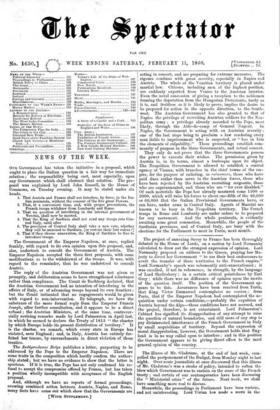NEWS OF THE WEEK.
OUR Government has taken the initiative in a proposal, which ought to place the Italian question in a fair way for immediate solution ; the responsibility being cast, most especially, upon any Government which shall obstruct that solution. The pro- posal was explained by Lord John Russell, in the House of Commons, on Tuesday evening. It may be stated under six heads.
1. That Austria and France shall not interfere, by force, in the Ita- lian peninsula, without the consent of the five great Powers. 2. That, at a convenient time, and, with proper precautions, the French troops withdraw from Lombardy and Rome. 3. That no question of interfering in the internal government of Venetia, shall now be mooted. 4. That the King of Sardinia shall not send any troops into Cen- tral Italy, until after 6. The provinces of Central Italy shall take a new vote, whether they will be annexed to Sardinia, [or restore their late rulers ?) 6. That if they choose annexation, the King of Sardinia be free to introduce troops.
The Government of the Emperor Napoleon, at once, replied frankly, with regard to its own opinion upon this proposal, and, also, undertook to consult the Government of Austria. The Emperor Napoleon accepted the three first proposals, with some modifications as to the withdrawal of the troops. It was, with regard to the remainder, that he was understood to consult Austria. • The reply of the Austrian Government was not given so promptly, and deliberation seems to have strengthened reluctance rather than compliance. The Count de Rechberg declared, that the Austrian Government had no intention of interfering in the affairs of Italy, or of advancing troops beyond its own frontiers ; but the Count intimated that no engagements would be given with regard to non-intervention. By telegraph, we have the substance of the more formal reply from the Emperor Francis
Joseph, after further consultation, and it appears to be a direct refusal ; the Austrian Ministers, at the same time, controver- sially reviving remarks made by Lord Palmerston in April last, in which' he seemed to declare the Treaty of 1815 " the charter by which Europe holds its present distribution of territory." It is the charter, we remark, which every state in Europe has violated, gave England ; and, in Italy, Austria has entirely for- feited her tenure, by encroachments in direct violation of those treaties.
The Indepenclance Beige publishes a letter, purporting to be addressed by the Pope to the Emperor Napoleon. There are some traits in the composition which hardly confirm the author- ship stated ; bat we have no evidence to show that the letter is spurious. If it is true, the Pope has not only confirmed his re- fusal to accept the compromise offered by France, but has taken
a position wholly incompatible with acceptance of the English proposal.
And, although we have no reports of formal proceedings, avowing combined action between Austria, Naples, and Rome, many foots have come out which show that the Governments are
acting in concert, and are preparing for extreme measures. The rigours continue with great severity, especially in Naples and Austria. The whole of the Venetian territory is placed under martial law. Citizens, including men of the highest position, are suddenly exported from Venice to the Austrian interior. Even the novel concession of giving a reception to the noblemen forming the deputation from the Hungarian Protestants, tardy as it is, and fruitless as it is likely to prove, implies the desire to be prepared for action in the opposite direction, to the South-. west. The Austrian Government has also granted to that of Naples the privilege of recruiting Austrian soldiers for the Nea- politan army ; a privilege already accorded to the Pope, most likely, through the Aide-de-camp of General Nugent. In Naples, the Government is acting with an Austrian severity ; one of the last steps being to proclaim a law rendering every man liable to imprisonment who is suspected, or " has in him the elements of culpability." These proceedings establish com- munity of purpose in the three Governments, and actual concert.
They only do not prove that the three Governments possess the power to execute their wishes. The permission given by Austria is, in its terms, almost a burlesque upon its object. The Neapolitan Government is allowed to establish a central agency at Vienna, with branches in. the chief towns of the em- pire, for the purpose of enlisting, as volunteers, those who have paid fines rather than serve in the Austrian forces, those who have been rejected by the Austrian recruiting sergeants, those who are superannuated, and those who are " for ever disabled." Of such materials the Pope has already mustered some 1500 or 2000, which will raise his forces to about one-fifth of the 40,000 or 60,000 that the Italian Provisional Governments have, or can have, under arms in Central Italy. Agents of Mazzini are known to be busy in the Neapolitan territory. The French troops in Rome and Lombardy are under orders to be prepared for any movement. And the whole peninsula, is evidently awaiting some great commotion. Meanwhile, the people of the Sardinian provinces, and of Central Italy, are busy with the elections for the Parliament to meet in Turin, next month.






























